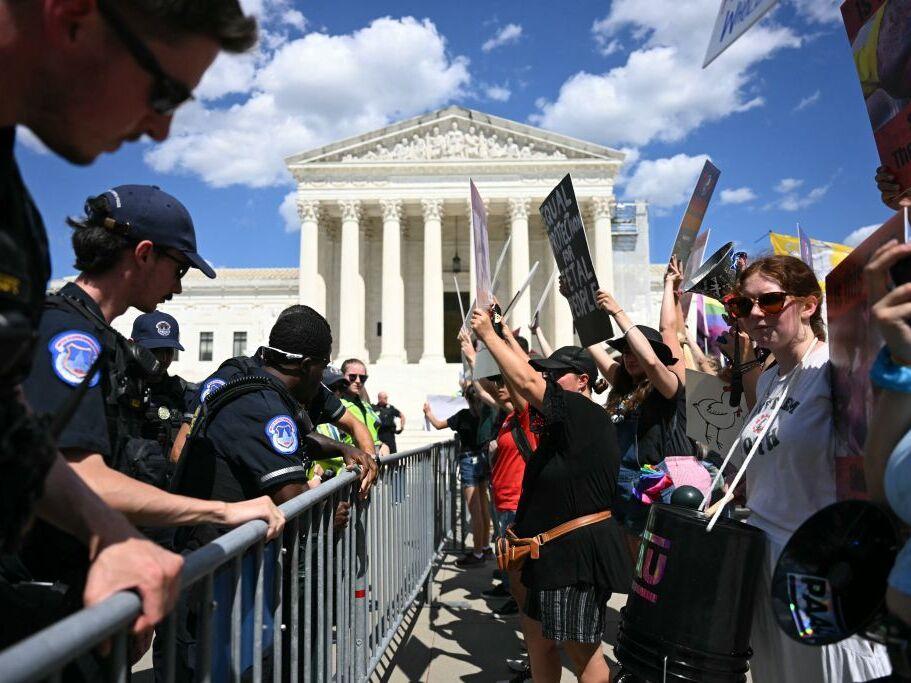Section Branding
Header Content
Republican candidates are downplaying abortion, but it keeps coming up
Primary Content
For generations, the GOP campaigned on eliminating the right to an abortion in the United States. Now, torn between a base that wants more restrictions on reproductive health care and a moderate majority that does not, it seems many Republicans would rather take an off-ramp than a victory lap.
And yet, they just can’t escape talking about it.
The policy high point for abortion opponents — the Supreme Court’s 2022 decision to strike down Roe v. Wade — is proving a low point for public support for their cause. More American adults consider themselves “pro-choice” than at any time in the past 30 years, according to a recent survey from Gallup: 54%, compared with 41% who identify as “pro-life.”
The tide is turning even as some conservatives seek restrictions on birth control and fertility treatments. A new KFF survey of women voters found that Democrats are more likely than Republicans to say that abortion is the most important issue in their vote for president — a reversal from recent elections. One in 5 women under age 30 and 13% of those under age 50 said it is their top concern. Among independents, 81% said they believed abortion should be legal.
Democrats are counting on the issue to help turn out their votes and ensure President Joe Biden’s reelection, despite persistent dissatisfaction with his leadership. Abortion could prove particularly disruptive in battleground states expected to have initiatives on the ballot to enshrine access to abortion in state constitutions, including Arizona and Nevada.
Eight in 10 Democratic women in states with possible ballot measures said they were “absolutely certain” they would vote — and also said they were more likely to back Biden compared with Democratic women in other states, KFF found.
So far, abortion rights supporters have prevailed in each of the seven states that have put ballot initiatives before voters — including in states where Republicans control the legislatures, such as Kansas, Ohio, and Kentucky. About two-thirds of women in Arizona told KFF they support the state’s proposed Right to Abortion Initiative, including 68% of independents.
On the campaign trail, Republicans are going to lengths to avoid the subject, even when that means distancing themselves from — well, themselves. Former President Donald Trump, who has taken a few different stances since calling himself “pro-choice” in 1999, reportedly urged lawmakers during a recent closed-door visit to the Capitol not to shy away from the issue, but also to support exceptions to bans, including to protect “the life of the mother.”
In pivotal Arizona, U.S. Senate Republican candidate Kari Lake, who embraced a near-complete abortion ban while running for governor two years ago, recently said “a full ban on abortion is not where the people are.” In Nevada, the GOP Senate nominee, Sam Brown, who as recently as 2022 headed up a branch of a conservative anti-abortion group, has said he will respect his state’s permissive abortion law and would not vote for a nationwide ban if elected.
The Supreme Court is keeping the issue on the front burner. In a decision June 27, the court left emergency abortions legal in Idaho, a state with a strict ban, though the issue remains unsettled nationally. Justice Ketanji Brown Jackson, who joined the majority in an unusual ruling that sent the case back to the lower court and declared it had been accepted prematurely, accused her colleagues of dawdling on the issue.
“Pregnant people experiencing emergency medical conditions remain in a precarious position, as their doctors are kept in the dark about what the law requires,” she wrote.
The KFF survey found broad, strong support for preserving access to abortion in cases of pregnancy-related emergencies: 86% of women voters — including 79% of Republican women — support laws protecting access in those circumstances.
In mid-June, the court rejected an effort to overturn the FDA’s 24-year-old approval of the abortion pill mifepristone, but only on a technicality. With no actual ruling on the merits of the case, the justices left open the possibility that different plaintiffs could provoke a different outcome. Nevertheless, the push to redefine reproductive health care post-Roe v. Wade continues. The influential evangelical Southern Baptist Convention recently called for significant legislative restrictions on in vitro fertilization, which its members call morally incompatible with the belief that life begins at fertilization.
Abortion opposition groups are pressing Trump not to discard a main plank of the GOP’s presidential platform since 1976: a federal abortion ban. Trump has recently said states should make their own decisions about whether to restrict abortion.
Democrats and Democratic-aligned groups are exploiting Republicans’ discomfort with the issue. On the day Senate Democrats forced a vote on legislation that would have guaranteed a federal right to contraception, a group called Americans for Contraception floated a giant balloon shaped like an IUD near the Capitol. (Republicans blocked the bill, as expected — and no doubt Democrats will frequently remind voters of that later this year.)
A week later, Senate Democrats tried to bring up a bill to guarantee access to IVF, which Republicans also voted down. No giant balloon for that one, though.
Republicans still appear hopeful they can avoid accountability for the unpopularity of their reproductive health positions, if only by highlighting other issues they hope voters care about even more — notably, the economy. But one thing they’re unlikely to accomplish is keeping the issue out of the news.
KFF Health News is a national newsroom that produces in-depth journalism about health issues and is one of the core operating programs at KFF — an independent source for health policy research, polling, and journalism.

